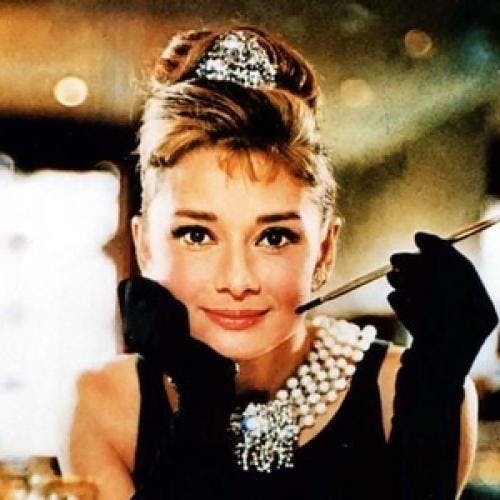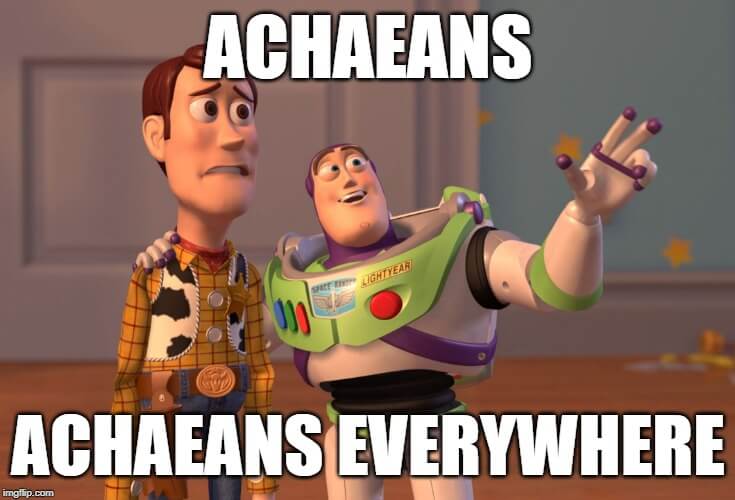Ricochet is the best place on the internet to discuss the issues of the day, either through commenting on posts or writing your own for our active and dynamic community in a fully moderated environment. In addition, the Ricochet Audio Network offers over 50 original podcasts with new episodes released every day.
 Group Writing: Ab-so-bloomin-lutely Loverly
Group Writing: Ab-so-bloomin-lutely Loverly
 Audrey Kathleen Ruston was born 90 years ago, on May 4, 1929 in Brussels, Belgium, the daughter of a member of minor Dutch nobility and a peripatetic English financier father who later changed his name to the double-barrelled “Hepburn-Ruston” to show his connection (probably imagined) to one of the husbands of Mary, Queen of Scots.
Audrey Kathleen Ruston was born 90 years ago, on May 4, 1929 in Brussels, Belgium, the daughter of a member of minor Dutch nobility and a peripatetic English financier father who later changed his name to the double-barrelled “Hepburn-Ruston” to show his connection (probably imagined) to one of the husbands of Mary, Queen of Scots.
Her childhood (ably, and very readably, documented in the new book Dutch Girl), was spent bouncing around the world and trying to find her feet wherever she landed. A withdrawn and reserved child, she was uncomfortable around others, always felt awkward and out of place, and never thought she was “good enough” to please her parents. She eventually found her passion in dance, committing herself to ballet while in school in England, and then continuing with her studies when her mother moved back to Holland with her, to keep her “safe” after the outbreak of German/British hostilities. Of course, she wasn’t safe in Holland either, once the Germans began their occupation, and she suffered the horror of her beloved Uncle Otto, together with a cousin, being rounded up and shot for nothing at all, other than as an example to others of what the Nazis could do if they felt like it. Thus it always is with tyrants.
But as long as she could dance, the young “Edda van Heemstra,” (having taken her mother’s maiden name again for “safety” reasons) had a refuge and could find security and happiness inside herself and a sense of “belonging” with others. It was a talent she loved to share, and which she used to entertain members of the community and the Dutch Resistance during the war, through tough times of privation in which she, family members, and many millions of their countrymen, were reduced to grinding up Holland’s famous tulip bulbs to make some version of flour to cook with and eat, while all of Holland’s resources were taken to feed the Nazi war machine. The gastric and intestinal disturbances that started during the war were to plague Audrey all her life, and by some accounts, she was never completely well again.
After the war, Audrey moved back to London, continued her ballet studies, made a modest living as a chorus girl and bit player in several West End musical productions, and then began to appear in minor roles in British films.
She began to receive serious notice for her abilities after she appeared in the 1951 Broadway production of Gigi. Collette, the author of the novel on which the play was based, had seen Audrey in London, was impressed with her talent and suggested her for the lead role. Hollywood stardom followed two years later with Roman Holiday, in which she starred with Gregory Peck, and for which she became the first actress to win the “triple crown,” of an Oscar, a Golden Globe, and a BAFTA, for the same performance. And she received accolade after accolade for her work during the rest of the ’50s and early ’60s culminating with her iconic performance as Holly Golightly in Breakfast at Tiffany’s.
Two years later, she landed the role for which I salute her today.
She’s introduced to the movie audience with the phrase, “Shouldn’t we stand up, gentlemen? We’ve got a bloomin’ heiress in our midst!” And so we meet the cockney flower girl who belongs to the world. A word about the singing later, but meantime, look at the longing in her sweet face. What I see when I watch this performance is the little girl who was jumbled around all over the world, all her young life by well-meaning but rather selfish parents, a little girl looking for affection and security and belonging, and desperate for a world in which the people she loved were not disappeared in the middle of the night and never heard from again. What little girl wouldn’t want that? Wouldn’t it be so, so, loverly to live in a world like that? (Yes it would.)
It’s problematic, but part of the cinematic plot, as it often is in real life, that the knight in shining armor sent to rescue her and care for her is so flawed, but we just know, right from the start, that it’s all going to work out between Liza and Henry. So we can relax and, along the way we can enjoy (with a little bit of bloomin’ luck), the inimitable Stanley Holloway.
Audrey Hepburn devoted the last twenty years of her life to her family and her work as a UNICEF ambassador. In 1992, she received the Presidential Medal of Freedom from George H.W. Bush in recognition of her humanitarian efforts. She died of colon cancer at the age of 63, in 1993.
It was a lifelong disappointment that her own singing voice was not deemed good enough for My Fair Lady, and was dubbed in after the fact by Marni Nixon. Although Audrey could certainly carry a tune, she didn’t have much range, and I think this bit of video shows the wisdom of the decision.
But Audrey did sing in the movies, one of the most beautiful movie songs ever, so let’s include that here. Audrey, and a very young and handsome George Peppard (I love it when a plan comes together):
And I’ll end on a personal note, with my granddaughter, who could have been anything she wanted for Halloween last year (she was ten at the time). As she’s done every year of her life since she was two, she asked Granny to make her costume. Who did she dream of being?
Audrey Hepburn.
I had a glorious frisson of dressmaker excitement when I imagined the Ascot scene from My Fair Lady (what a magnificent sewing challenge!), but it turned out she wanted the little black dress, worn by a character she’d seen photos of, in a movie she’d never seen, but whose style she admired greatly. So, LBD it was:
Here’s to little girls everywhere who struggle to bloom where they are planted. May they all find a way to grow and thrive.
Published in Group Writing




This reminds me of a billboard around here: I want to be bigger (said by no black dress ever).
Whew. I was actually contemplating one of my rare long posts in honor of Hepburn’s birthday, but the above does it so well, I’m off the hook.
In the recent thread about movies, I mentioned Two for the Road. Hepburn and Finney, Stanley Donen directing, Frederic Raphael screenplay, and Mancini music. Yes, they don’t make ’em like that anymore.
I don’t think that means what you seem to imply it means in context.
Well, I thought about that actually, before I wrote it. Literally, I think it means what I meant, but that’s not how it’s usually taken. Perhaps I’ll go back and clarify. Thanks.
Rats. I’d enjoy another post about the loverly Audrey, so please don’t hold back. And thank you.
Where’s Andy Williams?
That’s from my daughter’s room. She’s also a dancer. I didn’t know Audrey’s history, thanks! I’m going to get that biography for her upcoming birthday. She’s only seen a couple A. H. films ( my fair lady and breakfast) and likes her, and the book sounds great!
Sabrina is great:
It’s a nice book, and an easy read (not sure how old your daughter is). Clearly she has good taste.
He was dragging his feet and didn’t record it until the following year. I was surprised to read that he never released it as a single.
My mother used to tell me when I was a child that I looked like her. I didn’t think so.
You be the judge.
I did like her very much, and we bring out My Fair Lady once in a while and watch it again.
If I remember correctly, Pygmalion was Dido’s brother who murdered her husband. I’m not sure what the connection is.
You are correct, but that’s a different Pygmalion. G.B. Shaw’s Pygmalion was a Greek sculptor who had given up on flesh-and-blood women, and fell in love with one of his marble ladies (Galatea). Aphrodite granted his wish that his creation could be brought to life, and they were married.
Ah, yes. I should have remembered.
I’m listening to the Aeneid now. The narrator is British and pronounces it Ee-nied (accent on the first syllable. I always heard A neid (accent on the second syllable). Which is correct?
I’m a Brit, but I put the emphasis on the second (penultimate) syllable. Always have. Maybe @arahant can weigh in?
You’re a sort of Brit.
My passport says I’m a Brit.
What a remembrance of one of the loveliest and classiest people in show business!
This conversation is part of our Group Writing Series under the May 2019 Group Writing Theme: Blooming Ideas. From flowers, to artists, to ideas, good or bad, do stop by and sign up!
Every reference I can find has the first syllable as unstressed, either “i” or “a,” and the second syllable stressed, sounding like that part of your leg, the Knee. The third syllable unstressed, so like the bad buddy of the ego and superego.
i nee’ id
Well, a quick Google search for ‘young Audrey’ pics tells me that you were both very sweet-faced little girls. I can see your fond Mother saying that. My own fond Mum also used to tell me when I was growing up that I looked like one or two of her favorite actresses. Well, except for what she used to call my “loppy lugs,” that is. (After a British (I think) children’s book, illustrated with photos of a bunny with abnormally (even for a rabbit) large and floppy ears. I could never see it myself. I mean, my ears have always been big, but they don’t flop, even though I say so myself . . . ).
Thanks, Arahant.
If I’ve read your posts correctly, you’ve spent more of your life on this side of the pond than on the other.
You’ve heard of the Iliad? In Greek, the -iad suffix means “the story of.” Ilium was another term for Troy. Thus, the Iliad translates out to
.
.
.
Troy Story.
True.
Bogart was infuriated with her as she blew so many scenes losing her lines, but she was great. She and Holden had a romance but she wanted children and he had had a vasectomy,
I had awesome grandmothers whom I dearly loved, but wow! You take the cake with that costume.
Thank you! We’ve run the gamut from “I want to be Darth Vader, but a “girl” Darth Vader” (which included some shiny stuff, glitter and a couple of bows), through mermaids, butterflies, peacocks, and Benjamin Bunny. One of my favorites, though, will always be the “Bumble” from the Rudolph, the Red Nosed Reindeer TV program. That was totally flying by the seat of my pants.
Here she is again (Mom’s shoes . . . ):